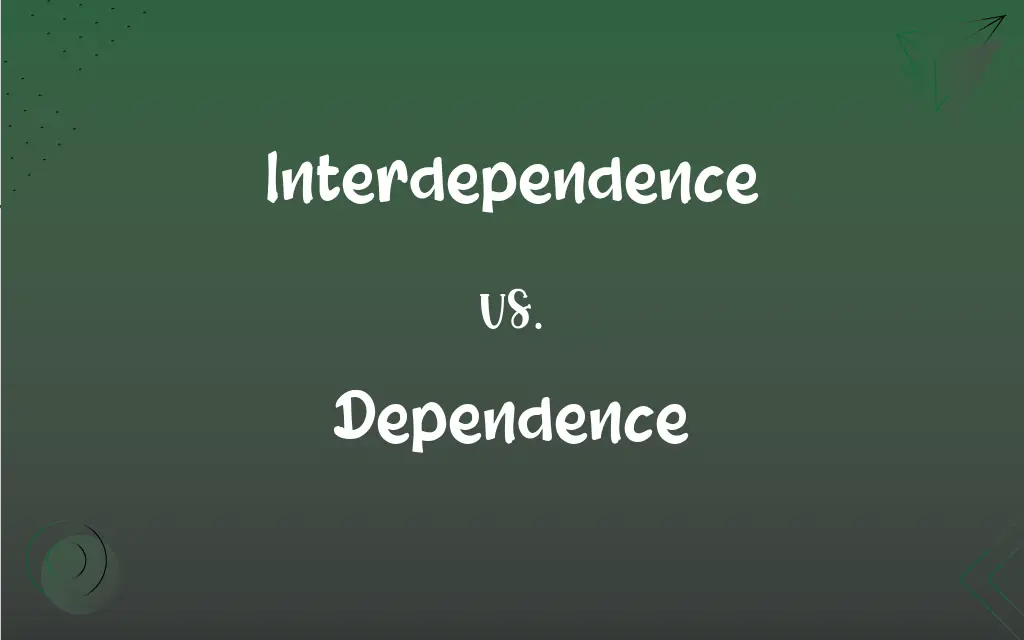Interdependence vs. Dependence: What's the Difference?
Edited by Harlon Moss || By Janet White || Published on December 6, 2023
Interdependence is a mutual reliance between two or more groups or individuals, where each benefits from the other. Dependence is a one-sided reliance where one party relies on another for support or resources.

Key Differences
Interdependence implies a reciprocal relationship where all parties benefit and contribute equally, fostering collaboration and mutual support. Dependence, in contrast, indicates a relationship where one party heavily relies on another, often leading to an imbalance of power and autonomy.
In interdependence, each member or group maintains their autonomy while benefiting from the strengths of others. This synergy enhances overall effectiveness. Dependence, however, often results in one party losing autonomy and becoming vulnerable to the decisions of the one they depend on.
Interdependence is often seen in healthy relationships and ecosystems, where each part supports the other, creating a stable, balanced system. Dependence can lead to vulnerability and a lack of self-sufficiency, making one party susceptible to the whims and conditions set by the other.
Interdependence encourages growth, resilience, and shared responsibility. In contrast, dependence can hinder personal growth and development, as the dependent party may not develop the skills or confidence to operate independently.
Interdependence and dependence both speak to relationships but differ in their nature of connection. Interdependence is about equal, mutual reliance, while dependence involves a lopsided reliance, often detrimental to one party.
ADVERTISEMENT
Comparison Chart
Nature of Relationship
Mutual and reciprocal
One-sided and reliant
Autonomy
Maintains individual autonomy
Often reduces autonomy
Benefit
Mutual benefits for all parties
Benefit primarily to one party
Power Dynamics
Balanced power dynamics
Imbalanced, often with one party dominant
Growth Potential
Fosters growth and resilience
Can hinder personal growth and development
ADVERTISEMENT
Interdependence and Dependence Definitions
Interdependence
Mutual reliance between two parties.
In a healthy ecosystem, the interdependence of plants and pollinators is crucial for survival.
Dependence
Need for support or resources from another.
The dependence of certain countries on imported oil affects their energy policies.
Interdependence
Mutual support and reliance in a relationship.
The interdependence of nations in global trade ensures economic stability for all involved.
Dependence
Reliance of one party on another.
A child's dependence on their parents is natural for their growth and development.
Interdependence
A balanced, interconnected system.
The interdependence of various departments in a company leads to overall efficiency and success.
Dependence
A condition of being influenced or determined by something else.
Her dependence on her team's feedback was critical for the project's success.
Interdependence
Shared responsibility and collaboration.
Successful team projects often reflect the interdependence of each member's skills and efforts.
Dependence
A state of needing something or someone.
The plant's dependence on sunlight is evident in its growth towards the light.
Interdependence
A reciprocal relationship where each party benefits.
The interdependence between teachers and students enhances the learning experience for both.
Dependence
A lack of self-sufficiency.
His dependence on GPS for navigation hindered his ability to learn the routes.
Interdependence
Mutually dependent
"Our physiology and that of the plants we eat are not only biochemically similar but interdependent" (Cindy Engel).
Dependence
The state of being determined, influenced, or controlled by something else
The economy's dependence on oil.
Interdependence
The condition of being interdependent.
Dependence
The state of being dependent on another for financial support.
Interdependence
Mutual dependence.
Interdependence
A reciprocal relation between interdependent entities (objects or individuals or groups)
FAQs
What is interdependence?
Mutual reliance among parties where each benefits.
What is dependence?
Reliance of one entity on another for support.
Does dependence imply weakness?
Not necessarily; it can be a natural part of relationships.
How does interdependence benefit teams?
It leads to shared responsibilities and collective success.
Can interdependence turn into dependence?
Yes, if the balance of mutual reliance is disrupted.
What is an example of healthy dependence?
A child's reliance on parents for nurturing.
Can dependence lead to exploitation?
Yes, if one party abuses the reliance of the other.
Can dependence be mutual?
If it's mutual, it's more akin to interdependence.
Is dependence always negative?
Not always; it can be natural and necessary in some contexts.
How does interdependence affect relationships?
It fosters mutual respect and collaboration.
Does interdependence require trust?
Yes, mutual reliance is based on trust.
Can an individual be independent within an interdependent system?
Yes, individual autonomy is maintained in interdependence.
Is interdependence important in global trade?
Yes, it ensures mutual benefits and stability.
How can dependence be harmful?
It can lead to loss of autonomy and vulnerability.
How does interdependence manifest in nature?
Through symbiotic relationships among species.
Is dependence always permanent?
No, it can be temporary or situational.
What role does interdependence play in society?
It fosters cooperation and societal cohesion.
Can dependence be overcome?
Yes, through developing self-sufficiency and skills.
Why is interdependence vital in ecosystems?
It maintains ecological balance and biodiversity.
Can dependence be healthy in adult relationships?
It can be, if it's balanced and respectful.
About Author
Written by
Janet WhiteJanet White has been an esteemed writer and blogger for Difference Wiki. Holding a Master's degree in Science and Medical Journalism from the prestigious Boston University, she has consistently demonstrated her expertise and passion for her field. When she's not immersed in her work, Janet relishes her time exercising, delving into a good book, and cherishing moments with friends and family.
Edited by
Harlon MossHarlon is a seasoned quality moderator and accomplished content writer for Difference Wiki. An alumnus of the prestigious University of California, he earned his degree in Computer Science. Leveraging his academic background, Harlon brings a meticulous and informed perspective to his work, ensuring content accuracy and excellence.






































































